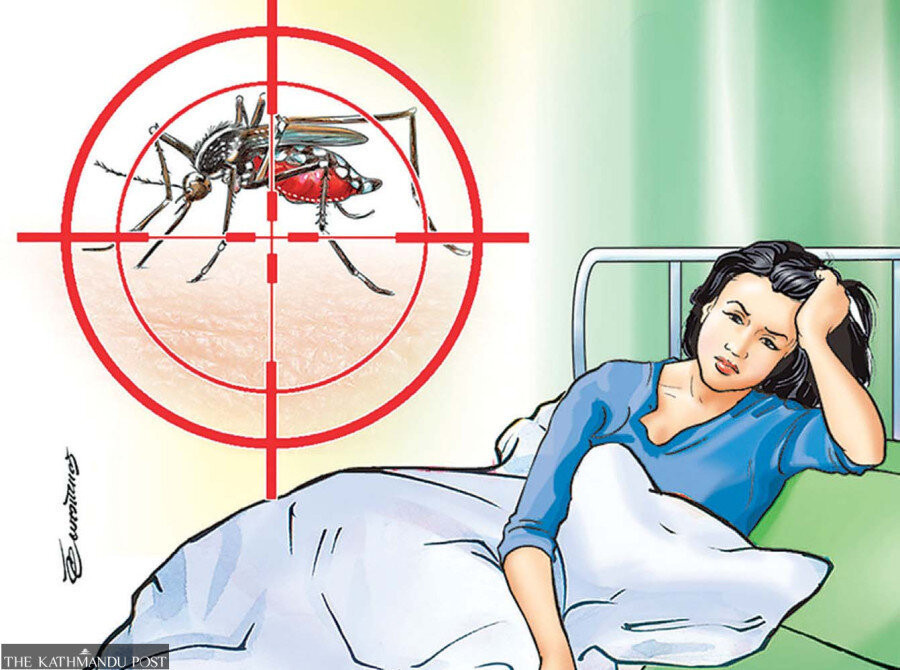Health
Dengue surge overwhelms hospitals, sparks blood crisis
Central blood bank says it brought 112 pints of blood from Simara on Thursday, but daily demand exceeds 300 pints.
Arjun Poudel
Of six seriously ill patients receiving intensive care at the Sukraraj Tropical and Infectious Disease Hospital on Friday, five are infected with the dengue virus.
The hospital’s emergency department, which treated 35 patients within 24 hours on Friday, said that 23 of them (or 66 percent) were dengue cases.
“Of late, the number of dengue cases has grown alarmingly in Kathmandu Valley,” said Dr Yuba Nidhi Basaula, director of the hospital. “Seventy to 80 dengue patients seek care at our hospital daily.”
What concerns doctors is that the number of severe dengue cases is rising along with the number of mild cases. According to Basaula, the number of patients with severe stomach pain, vomiting, and bleeding from nose, gums, and stool is increasing.
“We transfuse platelets to the patients whose platelets count is too low,” said Basaula. “We advise those suffering from severe dengue not to wait at home for too long and to seek hospital care as soon as possible.”
Dengue is a mosquito-borne disease transmitted by female Aedes aegypti and Aedes albopictus mosquitoes. The same vector also transmits chikungunya, yellow fever, and Zika viruses, according to the World Health Organisation.
At least nine deaths and over 20,000 infections have been reported from all 77 districts across the country. Experts say reported dengue cases could be just the tip of the iceberg, as around 90 percent of the infected people do not show any symptoms.
The post-monsoon period is considered a high transmission season for dengue, but Nepal has witnessed outbreaks of the deadly disease since the beginning of the year and across the pre-monsoon, monsoon, and post-monsoon seasons.
“Hundreds of people in the Kathmandu Valley might have been infected with dengue virus in recent days,” said Dr Sher Bahadur Pun, chief of the Clinical Research Unit at the Sukraraj Hospital. “As post-monsoon is the peak dengue season, neither the general public nor the authorities concerned have taken the issue seriously, and the rise in infection rate was obvious.”
Doctors at Patan Hospital have also reported a surge in dengue infections in recent days.
“On Thursday, 38 patients with high fever tested positive for dengue,” said Dr Ravi Shakya, director at the hospital. “Along with a surge in new infections, the number of complicated cases has also been rising.”
Officials at the Ministry of Health and Population also said the number of dengue infections has surged in the three districts of Kathmandu Valley—Kathmandu, Lalitpur and Bhaktapur—as well as in Tanahun and Kaski, among other districts.
“It is true that the number of complicated dengue cases have risen,” Dr Yadu Chandra Ghimire, director of the Epidemiology and Disease Control Division, the federal epidemic control body, concedes. “Even though dengue infections and complications have risen, case fatality has not.”
To make matters worse, the surge in dengue cases has, of late, caused a critical shortage of blood in the Kathmandu Valley. The Central Blood Transfusion Service (blood bank) said that hospitals in the Valley have been facing a surge in demand for platelet-rich plasma and platelet concentrate due to the spike in dengue cases.
“The daily demand for blood and blood components is about 400 pints, but we have only been able to collect about 20 to 30 pints,” said Sanjeev Kumar Yadav, senior technical officer at the Central Blood Transfusion Service. “We urge everyone eligible to come forward and donate blood. We have been struggling to meet the demand, and families of critically ill patients are in a difficult situation as they can’t find blood.”
Officials attributed the decline in blood collection to the Dashain holidays. They say the closure of colleges for the Dashain holidays and the suspension of blood donation campaigns by many offices and organisations during the festival have led to a sharp drop in donations.
In a bid to manage the acute blood crisis in the Valley, the blood bank on Thursday brought blood from Simara in Bara district.
“We brought 112 pints of blood from Simara on Thursday to address the shortfall in Kathmandu,” said Yadav. “But we have not been able to meet the growing demands. We have been requesting all eligible people and organisations to donate, but that too is not yielding desired results. Relatives of patients have been facing a tough time managing the blood needed for their dear ones.”
As there is no specific treatment for dengue, health workers provide symptomatic care and diagnose patients based on symptoms including transfusion of platelet-rich plasma.
According to doctors, mild to high fever, severe muscle pain, rashes, severe headache, and pain in the eyes are some symptoms of dengue.
The World Health Organisation (WHO) says there is no specific treatment for severe dengue, but early detection and access to proper medical care can save lives.




 23.12°C Kathmandu
23.12°C Kathmandu















